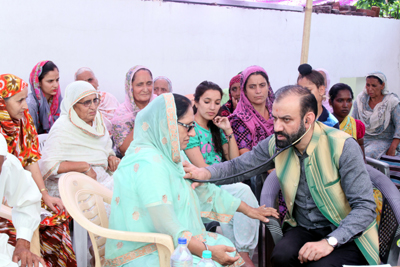Excelsior Correspondent
JAMMU, Sept 17: Highlig-hting the iniquitous impact of cardiovascular diseases on female gender Dr. Sushil Sharma HoD Cardiology GMC Jammu today held a day long camp with the residents of Upper Beli Charana at Gurudwara Singh Sabha, Jammu City.
Men and women alike can experience the well-known heart attack symptoms like gripping chest pains and breaking out in a cold sweat. But women can also have subtler, less recognizable symptoms such as pain or discomfort in the stomach, jaw, neck or back, nausea and shortness of breath. As a result, women are often unaware what they are experiencing is a heart attack. So what happens women blow off the warning signs, assuming something else is the problem. Heart disease kills 500,000 women every year 10 times more than breast cancer and more than all other cancers combined. It’s also a leading cause of disability. Near about eight million women are living with it,” he said.
To add to the problem, Dr Sharma said, healthcare providers may misdiagnose these symptoms, and the result is that women discover their heart disease when it’s too late. Men, on the other hand, seem to benefit from having more frequently participated in clinical trials, and more aggressive diagnostic testing and treatment.
Pointing out towards some staggering disparities regarding impact that CVDs are exhibiting on different genders, Dr Sushil highlighted that women aged 45 and younger are more likely than men to die within a year of their first heart attack.
“Coronary Micro vascular disease is more common in women than in men. The same risk factors that cause problem with larger coronary arteries such as hereditary, age, race, blood pressure, blood cholesterol, smoking may also contribute to coronary micro vascular diseases. Women appears to be more affected by high blood pressure, smoking and diabetes. In addition to this there are host of other risk factors unique to women. Women experience pregnancy, menopause and are prescribed contraceptive pills and post menopausal oestrogen,” Dr. Sushil emphasised.
Trending Now
E-Paper




